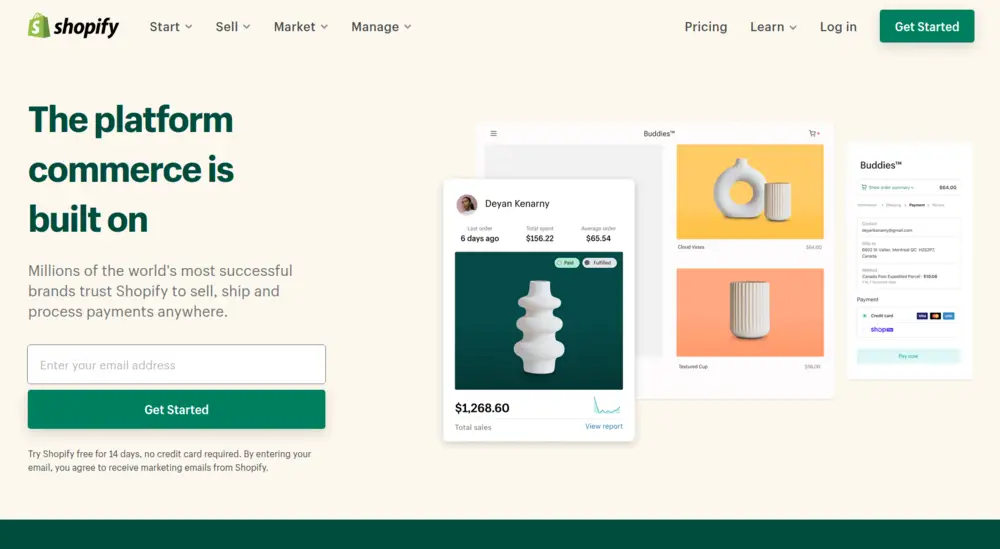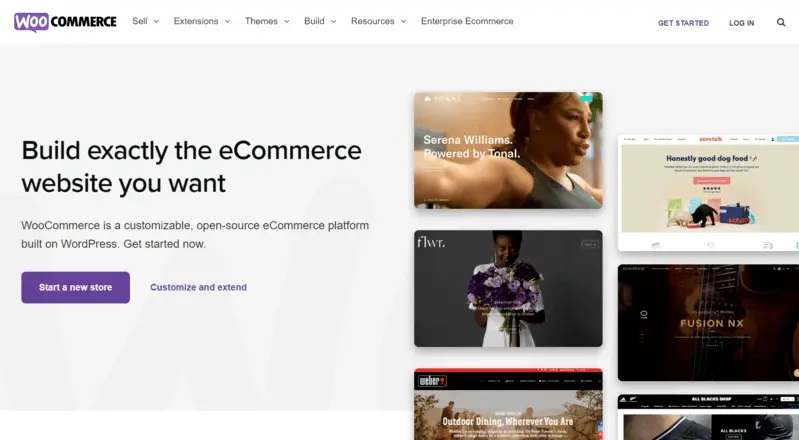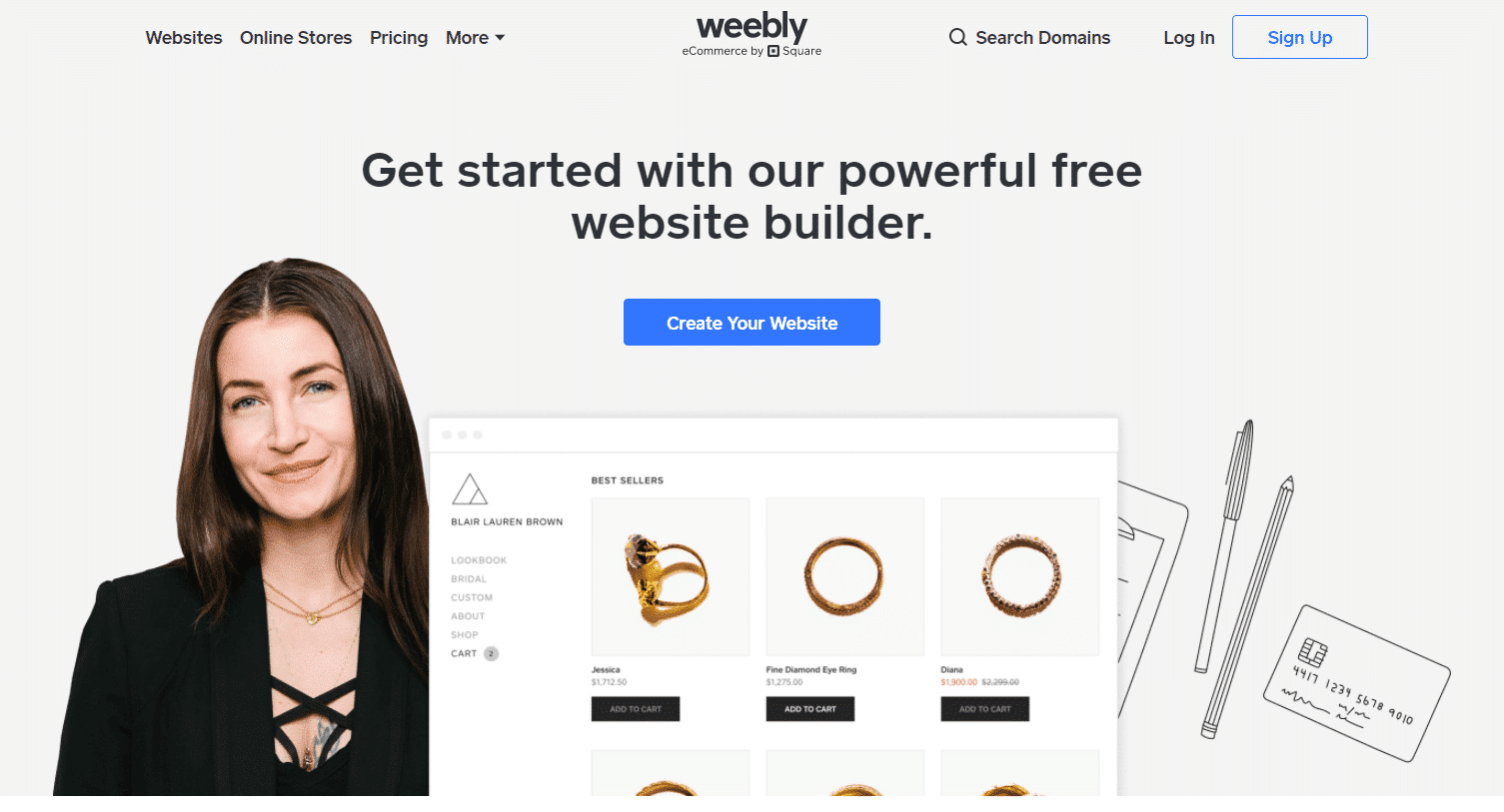Searching for the best eCommerce platforms for SEO?
You’re in the right place!
Ever noticed how some online stores always pop up first in search results? That’s because of SEO – Search Engine Optimization.
It’s a big deal for making your site easy to find on the internet.
Many top eCommerce platforms, like Shopify, have SEO tools built right in. This helps your online store show up better in searches.
With online shopping growing fast, picking the right platform is super important. Forbes says online buying will jump to 24% by 2026. The platform you choose can really affect how well your store performs.
It’s important to pick a platform known for good SEO.
This helps more people visit your store.
Not all platforms are the same. Some are great at boosting your store’s online presence through SEO, others not so much.
I’ve done my research and put together a list of the top 10 eCommerce platforms that are awesome for SEO. These platforms help your store get noticed and connect with customers all over the world.
More people like to shop online these days.
So, the platform you pick is a big decision for your business.
In this article, we’ll focus on:
So, let’s dive in and explore these leading eCommerce platforms.
1. Shopify

Shopify is the best option for you if you’re diving into the eCommerce business world. It’s super easy to use, even if you’re just getting started. It’s an excellent eCom solution, scaling perfectly for various business sizes and types. This platform is particularly ideal for dropshipping, point-of-sale, and multi-currency eCommerce.
With Shopify, managing an online store becomes straightforward, offering excellent multi-currency selling features and built-in email marketing tools.
With Shopify, setting up a shop online is a breeze.
And for SEO? It’s top-notch!
It offers customizable titles and meta descriptions, automatically generates sitemaps, and creates clean, crawlable URLs.
All Shopify themes are mobile-responsive.
Speed is key too, and Shopify is lightning fast. It even throws in a free SSL certificate to keep your store safe – a big yes for SEO.
If you love writing, you’ll enjoy its blogging platform.
It’s also got handy things like alt tags for images, and if you ever need more, there’s a whole store of extra SEO tools in the Shopify App Store.
Top Features of Shopify
Here’s an overview of the key features and benefits of Shopify:
- User-Friendly Interface: Easy for beginners.
- Multi-Channel Selling: Sell on social media, online, or in person.
- Robust SEO: This makes it one of the best eCommerce platforms for SEO.
- Dropshipping Friendly: Integrates with major dropshipping apps.
- Multi-Currency Support: Ideal for international sales.
- Shopify Payments: Streamlines transaction processes.
- Abandoned Cart Recovery: Helps recover lost sales.
- Shopify POS: Enables selling in physical locations.
- Diverse App Integration: Over 8,000 apps for customization.
No matter the size of your business, Shopify scales with you.
It’s great for all sorts of products, even digital ones and subscriptions.
And it’s not just a few people using it – we’re talking over 4.7 million stores in more than 175 countries. That’s a lot of happy customers!
Pros of Shopify
- Ease of Use: Shopify’s interface is straightforward, making setting up an online store simple.
- SEO-Friendly: As one of the best eCommerce platforms for SEO, it enhances your store’s online visibility.
- Versatility in Selling: Whether it’s online, in-person, or through social media, Shopify covers all bases.
- Excellent Support: 24/7 customer service ensures you’re never alone in your journey.
- Shipping Discounts: Enjoy significant discounts on shipping rates with major carriers.
Cons of Shopify
- Cost: The advanced features come at a higher price, making it a bit expensive for some businesses.
- Limited Free Themes: The number of free themes is less compared to other platforms.
- Transaction Fees: Using third-party payment gateways incurs additional fees.
So, in a nutshell, Shopify is your go-to for the best eCommerce platforms for SEO. It’s friendly, flexible, and packed with features to meet your business needs. Whether you’re a small start-up or a big enterprise, Shopify’s got your back.
2. WooCommerce

WooCommerce is a highly popular and efficient plugin for WordPress, transforming your site into a dynamic online store.
It stands out as one of the best eCommerce platforms for SEO, thanks to its robust features and flexibility. If you’re using WordPress, WooCommerce seamlessly integrates with your existing site, offering a familiar interface and user-friendly experience.
With more than 5 million active installations of WooCommerce on WordPress, it powers over 28% of all online stores. It’s used by 3.5% of all websites globally, making it one of the most popular eCommerce solutions.
Top Features of WooCommerce
- Free and Open Source: It’s free to use, making it a cost-effective solution.
- Customizable: Tailor your store with various themes and extensions.
- Wide Range of Features: Features for managing products, orders, and customers.
- Global Reach: Supports multiple languages and currencies for international sales.
- Scalable: Grows with your business, handling everything from A-Z.
- Strong Community Support: Large community of users and developers.
- SEO-Friendly: Integrates well with SEO plugins, enhancing your site’s visibility.
WooCommerce is great for those desiring control and customization. Its compatibility with a plethora of themes and plugins means you can design a store that truly reflects your brand. Moreover, its SEO capabilities ensure your products rank well on search engines, crucial for driving traffic and sales.
In terms of pros, WooCommerce’s integration with WordPress is seamless, providing a familiar environment if you’re already a WordPress user. Its open-source nature allows for extensive customization – you can tweak nearly every aspect of your store.
Additionally, the community support is exceptional, with numerous forums, tutorials, and resources available.
Pros of WooCommerce
- Free and Open Source: No initial cost, with open-source flexibility.
- WordPress Integration: Seamless integration with WordPress websites.
- High Customizability: Extensive customization options with themes and plugins.
- Strong SEO Capabilities: Excellent for SEO, enhancing online visibility.
- Global Reach: Supports multiple languages and currencies.
- Scalable: Suits businesses of all sizes, from small shops to large enterprises.
- Strong Community Support: Large user and developer community for assistance and resources.
- Rich Feature Set: Comprehensive features for product, order, and customer management.
- WooCommerce Payments: Integrated payment processing solution.
- Developer-Friendly: Offers extensive customization for those with technical expertise.
- Regular Updates: Continuously updated for security and functionality.
However, there are some cons to consider.
Cons of WooCommerce
- Requires WordPress: Only works with WordPress websites.
- Additional Costs: Key features and themes may incur extra costs.
- Self-Hosting Required: You’re responsible for hosting, maintenance, and security.
- Limited Support: Direct support mainly through community forums and documentation.
- Technical Proficiency Needed: Customizing and troubleshooting may require technical skills.
- SEO Dependency: Relies on additional plugins for advanced SEO capabilities.
So, if you’re not already using WordPress, this could be a limitation. Since WooCommerce is a WordPress plugin, it requires a WordPress site to function.
Also, while the plugin itself is free, some of the more advanced features and themes come at a cost. Plus, being a powerful tool, it has a steeper learning curve compared to more straightforward platforms.
But, WooCommerce is still a top contender among the best eCommerce platforms for SEO, especially for those already comfortable with WordPress. Its blend of power, flexibility, and cost-effectiveness makes it a go-to choice for many online retailers. Whether you’re starting small or scaling up, WooCommerce has the capabilities to support your eCommerce journey.
3. Weebly

Weebly makes building websites easy, even if you’re completely new to website building. Overall, it’s great website-building software for anyone starting in e-commerce. You don’t need to know any coding or tech skills to build a website with Weebly. And, the best part? It’s really simple to drag and drop things to create your site. Plus, it’s pretty affordable, starting at $10 a month if you pay for a year.
I like that Weebly gives you lots of storage in its pricing plans.
It’s also great for SEO and makes it easy to get noticed on search engines, connects with people through email and social media, and looks good on any screen size.
And, for those desiring more control, an HTML/CSS Editor is available.
They also have a built-in blog feature that’s easy to use and manage. And, for online shops, you’ll get everything you need, like a shopping cart and different ways to take payments from customers, including Square and PayPal.
And, if you are looking for ratings or Weebly reviews, people have given Weebly 1.8 out of 5 stars on Trustpilot, which is not so great. But, it’s quite better at 4.2 out of 5 stars on G2, showing that lots of users like it.
Top Features of Weebly
Here are some top features of Weebly.
- It’s easy for beginners.
- Building a website is a breeze with the drag-and-drop feature.
- It’s budget-friendly and even has a free option.
- You get lots of storage space.
- Your website will look good on phones and tablets.
- It helps with SEO and marketing.
- Blogging is easy to add.
- It’s got all you need for an online store.
Weebly’s free plan has basic e-commerce tools and keeps your site secure. If you pay a bit more, you get extra features like your own website address (domain), better tracking of your website visitors, and, of course, no ads.
For eCommerce businesses, the Performance plan at $26 monthly is particularly great, providing item reviews, abandoned cart emails, and advanced insights.
Pros of Weebly
- Weebly is super user-friendly, which I think is great for beginners.
- It’s a good choice for small businesses or startups because it’s not expensive.
- All plans keep your site safe with SSL security.
- It has everything you need for an online store.
- More storage and no limits on visitors with higher plans, which is great for growing your e-commerce business.
Cons of Weebly
- The free Weebly plan shows ads unless you upgrade.
- You might find the customization a bit limited.
- Only the more expensive plans offer phone support, which might not be ideal if you’re on a tighter budget.
Overall, Weebly is a solid choice for SEO and e-commerce, especially if you’re just starting or have a small business. It’s easy to use and won’t break the bank. Even though it’s not perfect in customization and support, the value it offers is pretty impressive. You can start with the free Weebly plan and see if it works for you.
4. Squarespace
Squarespace is one of the best eCommerce platforms for SEO and website building. It’s an all-in-one solution that simplifies the process of creating and managing a website for both individuals and businesses.
Founded in 2003 in New York by Anthony Casalena, Squarespace is a long-time player. It gives you access to powerful tools for eCommerce, SEO, and blogging as well. This platform is known for its impressively intuitive tools and user-friendly interface, making it stand out from other eCommerce platforms on the market.
Top Features of Squarespace
Key features and benefits of Squarespace include:
- Drag-and-drop website builder for ease of use.
- Professionally designed, mobile-friendly templates.
- Advanced website analytics and customer accounts on most plans.
- Integrated eCommerce features for setting up an online store.
- Built-in blogging tools and reliable 24/7 customer support.
- SEO features for improved website visibility.
This platform really shines as an eCommerce platform due to its user-friendly service and range of professionally designed templates.
It’s ideal for creating visually good-looking professional websites, perfect for an eCommerce store. The platform also caters to various needs, from portfolio websites for artists and photographers to robust online businesses.
However, while Squarespace excels in many areas, it does have some limitations. One notable con is that it doesn’t offer a free plan, which might be a barrier for some users. Also, the platform, while intuitive, can have a bit of a learning curve, especially for those new to website building. But, it shouldn’t be an issue in most cases.
Pros of Squarespace
- Intuitive Design Tools: You can easily create a professional-looking website.
- High-Quality Templates: Your website will look modern and stylish, crucial for attracting customers and buy from your website.
- Strong SEO Capabilities: It’s among the best eCommerce platforms for SEO, helping your site rank better in search results.
- Robust eCommerce Features: Squarespace offers just about everything you need to start and manage an online store easily and efficiently.
Cons of Squarespace
- No Free Plan: Unlike some other platforms, there’s no free version available.
- Learning Curve: It might take some time to get used to the platform.
If you’re looking for an eCommerce platform that combines style, functionality, and strong SEO capabilities, Squarespace is a fantastic choice. It’s particularly well-suited for those looking to create an elegant and effective online presence, and while it may require a bit of learning, the results are usually worth the effort.
5. BigCommerce
BigCommerce is a hosted eCommerce platform that’s designed to help you build and manage your online store easily. It’s a great choice if you’re looking to create a professional online presence and have a tool that’s easy to use. BigCommerce is especially good for search engine optimization (SEO), which is super important if you want your store to show up in search results.
What’s great about BigCommerce is that it’s a Software-as-a-Service (SaaS) platform. This means you use it over the internet and pay a monthly or yearly fee, instead of owning the software and hosting it on your server like WooCommerce. This setup is really useful for small business owners. The Standard Plan, for example, has a lot of what you need to run an e-commerce site, and it starts at $29 per month.
Top Features of BigCommerce
Here are some key features and benefits of BigCommerce:
- Well-rounded entry-level plan: Perfect for new online shop owners.
- Drag-and-drop website builder: Easy to design your store.
- Variety of product options: Lots of ways to display what you’re selling.
- Blogging and SEO tools: Helps your store rank better in search results.
- Strong reporting functionality: Understand how your store is doing.
- Sales limit of $50,000 in the Standard plan: Enough for new businesses.
- Upgrade for more features: More sales limits and extra features in higher plans.
One of the best things about BigCommerce is that it’s really good for SEO. This means that when people search for products like yours, your store is more likely to show up in the search results. This is super important for online stores.
When you’re trying to choose the best eCommerce platform, it’s important to think about how easy it is to use, and BigCommerce scores well here. It’s user-friendly and perfect for people who aren’t tech experts. Plus, with its integrated payment systems and built-in marketing tools, it’s a great all-in-one solution.
Now, let’s talk about the pros and cons of BigCommerce.
Pros of BigCommerce
- No transaction fees: You save money on each sale.
- Multi-channel selling: Sell on different platforms easily.
- Strong SEO capabilities: Helps your store get found online.
- 24/7 customer support: Help is always available.
Cons of BigCommerce
- Sales limit: You have to upgrade your plan if you sell more than the limit.
- Limited free themes: Fewer options to start with.
- Learning curve: Takes a bit of time to get used to it.
BigCommerce is a strong choice among hosted eCommerce platforms. It’s user-friendly, great for SEO, and has a variety of tools to help you succeed online.
Whether you’re just starting or looking to grow your online store, BigCommerce has something to offer. Just remember, like any online platform, it has its own set of advantages and downsides that you should consider.
6. Wix
Wix is another popular choice when you’re looking to create an e-commerce site. It stands out for its ease of use and rich feature set, making it a top-rated website builder. With Wix, you can easily design a professional-looking online store.
It scores impressively high in user reviews on TrustPilot, earning a 4.8 out of 5 overall score from over 12900 reviews. This high rating is due to its user-friendly drag-and-drop tools and a vast selection of eCommerce tools, making it a go-to option for those who want to open an online store.
Top Features of Wix
Here are some key features and benefits of Wix:
- User-friendly drag-and-drop building tools
- A wide range of e-commerce tools for online stores
- Over 800 customizable templates
- Impressive features and an extensive app store
- High levels of flexibility and creative freedom
- High uptime, with average uptime scores consistently at 100%
- Good response times, with an average of around 200 ms
- Free plan available with an extensive range of features
If you’re trying to choose the best ecommerce platform for your needs, Wix offers a feature-rich environment. It’s particularly great for small businesses, creatives, and beginners. It’s packed with SEO tools and hundreds of apps, allowing for tremendous flexibility in design and functionality.
Plus, anyone can create a beautiful website with Wix, regardless of their technical skills. However, it’s important to note that Wix isn’t perfect for everyone. If you desire extensive control over every aspect of your site, Wix might feel limiting. Despite its almost limitless creative control, there are some boundaries in its simplicity.
Pros of Wix
- Wix is incredibly easy to use, even for beginners.
- The drag-and-drop tools make site building straightforward.
- A variety of templates ensures your site can look exactly how you want it.
- Tons of features for e-commerce sites, such as online payment acceptance, abandoned cart recovery, and secure online payments.
However, there are some cons to consider.
Cons of Wix
One of the main downsides is that once you’ve published your site with a chosen template, you can’t switch templates without starting from scratch. This can be frustrating if you want to redesign your site. Also, for advanced functionality, you might need to pay extra for third-party apps. Wix sites can sometimes be slow-loading, which could impact user experience and SEO.
Overall, Wix is a powerful and user-friendly choice for building e-commerce sites. Its powerful features and ease of use make it an appealing choice.
7. Adobe Commerce
Adobe Commerce, previously known as Magento, stands out as a robust eCommerce platform designed primarily for medium to large-scale businesses. It’s renowned for hosting over 250,000 websites, including prominent brands like HP and Shoebacca. The platform’s exceptional customization, flexibility, and scalability are its core strengths, offering businesses the tools to craft unique customer experiences.
Adobe Commerce sets itself apart from other leading eCommerce platforms with its extensive and SEO-friendly features.
It integrates seamlessly with various sales channels, both online and physical, and provides in-depth reporting, professional themes, and image optimization, all of which contribute to faster content delivery and enhanced user experience.
Top Features of Adobe Commerce
Key features and benefits of Adobe Commerce include:
- Highly customizable and flexible platform.
- Ideal for medium-sized and enterprise-level businesses.
- Multi-channel commerce support, including B2B and B2C models.
- Integrations with more than 3,600 native extensions in the Adobe Marketplace.
- Advanced security measures including credit card tokenization and PCI compliance.
- In-depth analytics and reporting tools.
- Fastly Image Optimization for quick image loading.
- Robust inventory and order management systems.
- Integrated B2B functionalities for streamlined business operations.
Furthermore, Adobe Commerce excels in offering SEO tools and features that are crucial for any business aiming to enhance its online visibility.
Its SEO-friendly structure helps in better ranking on search engines, which is a significant advantage for businesses focusing on digital growth.
Pros of Adobe Commerce
- Highly scalable platform that grows with your business.
- It’s packed with features that cater to a wide range of e-commerce needs.
- The platform’s security measures are top-notch, ensuring data protection and compliance with industry standards.
Cons of Adobe Commerce
- Adobe Commerce can be quite expensive for small businesses and
- It is known for its complexity in setup, often requiring professional assistance.
- The platform’s opaque pricing also means that you need to contact a representative for a quote, which can be a drawback for many businesses.
However, Adobe Commerce is a powerful and versatile eCommerce solution, especially suitable for businesses looking for an all-in-one platform with advanced features and scalability. Its SEO-friendly features make it a strong contender among the leading eCommerce platforms out there, although the costs and technical requirements might be challenging for smaller businesses.
8. Volusion
Volusion is a popular eCommerce platform for SEO and has been serving the online retail community since 1999. It stands out due to its comprehensive suite of features tailored for small to medium-sized businesses (SMBs). Particularly notable are its inventory and order management capabilities, customizable themes, and robust sales and marketing tools.
Volusion offers a range of responsive themes, including 11 free and 34 paid options, making site customization a breeze.
The drag-and-drop editor enhances the ease of personalizing your site.
For businesses focused on physical products, Volusion is a particularly strong contender. It allows the creation of unlimited product options and variants, which is essential for businesses with diverse product lines.
This eCom platform is also equipped with in-house design and marketing services, streamlining the process of developing and promoting your online store. The ability to integrate over 1,000 apps through Zapier expands its functionality significantly, allowing you to tailor your storefront to your specific needs.
Key Features of Volusion
- Customizable Themes: Choose from 11 free and 34 paid themes.
- Unlimited Product Options: Product listings with various options and variants.
- In-House Services: Access design and marketing services directly through Volusion.
- App Integration: Over 1,000 apps can be integrated for enhanced functionality.
- Inventory: Streamline inventory processes with smart management tools.
- Payment Processing: Offers in-house and 3-party payment gateways, including PayPal and Stripe.
Volusion, being among the best eCommerce platforms, offers almost all essential tools for online success. The platform’s SEO capabilities are noteworthy, allowing easy optimization of your pages and products to rank better in search engines.
However, it has limitations, such as the inability to sell digital products and a complicated store builder, which might be challenging for beginners. The basic plan also limits the number of products and the gross merchandise volume.
Pros of Volusion
- Strong SEO Tools: Enhances your online visibility and search engine ranking.
- Responsive Customer Support: Provides support via live chat, email, and phone.
- No Transaction Fees: Volusion doesn’t charge additional transaction fees.
- Comprehensive Analytics: Offers detailed reports to track store performance.
Cons of Volusion
- Complex Store Builder: This can be challenging for those without technical skills.
- Physical Goods Only: Limits businesses that want to sell digital products.
If you’re an SMB looking to expand your online presence, nationally or globally, Volusion is a solid choice. Its strengths in inventory management, theme customization, and SEO tools make it a competitive option among the top e-commerce platforms on the market. However, consider its limitations and assess whether its feature set aligns with your business requirements.
9. OpenCart
OpenCart is a popular choice among the best eCommerce platforms for SEO, and it stands out as a robust and user-friendly solution for online stores. It’s been used by over 400,000 customers globally, which speaks volumes about its reliability and effectiveness. OpenCart is particularly appealing for small to medium-sized businesses due to its open-source nature and customizable features.
Top Features of OpenCart
Here’s a breakdown of its key features and benefits:
- Free and Open-Source: You can download and use OpenCart without any cost, which is great for keeping expenses low.
- Customizable: With over 13,000 extensions and add-ons, OpenCart allows you to tailor your online store to your specific needs.
- User-Friendly Interface: Managing your store is straightforward.
- Multiple Store Management: Handy if you’re running more than one online business.
- Multilingual and Multi-Currency Support: This is a big plus for global reach.
- Variety of Payment Gateways: Includes popular options like PayPal and Sage Pay.
- No Transaction Fees: OpenCart itself doesn’t charge any fees on transactions.
If you’re considering setting up an online store, OpenCart is a solid option, especially if you’re keen on customization and control over your website.
It’s one of the leading eCommerce platforms that offer significant flexibility.
And, all of these come without a hefty price tag.
Pros of OpenCart
- Cost-Effective: It is free to download and use.
- Highly Customizable: With thousands of extensions, you can tailor it to suit your unique business needs.
- Multi-Store Functionality: Manage multiple stores from one admin panel, which is super convenient.
- Language and Currency Support: This feature makes it easier to cater to an international audience.
Cons of OpenCart
- Requires Some Technical Know-How: While user-friendly, it does require some development knowledge for deeper customizations.
- Limited SEO and Marketing Tools: For advanced SEO needs, you might have to rely on additional tools or services.
- Self-Hosting Responsibilities: You’ll need to manage hosting, maintenance, and security on your own. It’s not a hosted platform.
- Cost of Add-Ons: While OpenCart is free, some extensions and themes cost money.
OpenCart shines as one of the best website builders for small to medium businesses looking for an affordable and customizable online store solution. Its open-source nature offers a high degree of flexibility, making it a valuable tool.
However, it’s crucial to have some technical knowledge or be prepared to learn, as this will greatly enhance your experience with OpenCart.
10. PrestaShop
PrestaShop is an open-source ecommerce platform, offering a comprehensive solution for individuals looking to start or expand their online business.
Originating in France in 2007, PrestaShop has grown into a globally recognized tool, powering over 300K active websites worldwide. It stands out among leading e-commerce platforms for its versatility and customization options, making it an ideal choice for entrepreneurs and businesses of all sizes.
The best part of PrestaShop?
It’s open-source. So, you can download it and customize it however you like.
However, to get the most out of PrestaShop, you might need some technical knowledge or the help of a developer, especially for deeper customization.
Top Features of PrestaShop
- Free and Open Source: You don’t have to pay to download it.
- Customizable: Choose from 1,500+ themes to customize your store’s appearance.
- User-Friendly: Even if you’re not a tech expert, it’s pretty easy to set things up.
- Product Management: Supports unlimited product listings, with tools for inventory management and restocking alerts.
- SEO-Friendly: It helps your store show up on Google.
- Lots of Payment Options: It works with PayPal, Amazon Pay, and more.
- Marketing Tools: You can use coupons and email marketing to attract customers.
- Legal Stuff: It helps you follow online store laws in different countries.
Overall, it’s a decent option to start your eCommerce business.
Pros of PrestaShop
- Customization: The platform’s open-source nature allows you to tailor almost every aspect of your online store, from design to functionality.
- Community Support: A robust user community and forums provide valuable resources and problem-solving assistance.
- Global Reach: With multi-language and currency support, PrestaShop is ideal for international businesses.
Cons PrestaShop
- Developer Reliance: For extensive customization, hiring a developer might be necessary, which could increase costs.
- Complexity for Beginners: While user-friendly, the vast array of options and settings can be overwhelming for new users.
- Additional Costs: While the software is free, expenses for web hosting services, add-ons, and professional support can add up.
In short, PrestaShop is a powerful tool for your online store.
It’s got loads of features and it’s flexible, but you might need a bit of technical know-how or some extra budget to get the most out of it.
If you’re serious about your online business and want a platform that can grow with you, PrestaShop is definitely worth checking out!
Final Verdict
Let’s wrap up this guide on the best eCommerce platforms for SEO.
I get how tricky it can be to pick the right one but remember, it’s all about what works best for you and your shop. Each platform we’ve looked at has its unique perks. So, think about what you need. Are you just starting, or maybe growing fast? Do you want something super customizable, or more user-friendly?
When you’re on the hunt for the best eCom platforms, it’s hard to overlook Shopify. Honestly, I think it’s a fantastic option, especially if you’re about to start an online store. Shopify really shines because it’s not just easy to use but also great for making your store pop up in those all-important search results.
So, if you’re thinking, “Which platform should I pick?”
My advice? Give Shopify a good look.
It’s user-friendly, perfect for both small businesses and growing ones, and packs a punch in the SEO department.
With Shopify, you’re setting yourself up for success right from the start.
The best part?
You can try Shopify absolutely free.
So, if you’re ready to start an online store and want to make a splash, consider Shopify. It’s among the top eCommerce platforms that understand SEO. With it, your store won’t just be another drop in the ocean. So, go ahead, and explore Shopify.

